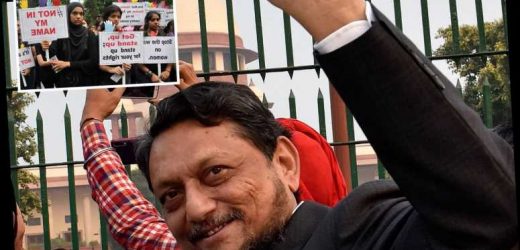A JUDGE has sparked fury after telling an accused rapist to marry his terrified victim if he wants to avoid jail in India.
Chief Justice Sharad Arvind Bobde, the country's top judge, is facing calls to resign, with more than 5,000 people signing a petition for him to quit.
The protests began after the judge told a man, accused of raping a minor girl, if he was willing to marry her.
Bobde said: “If you want to marry (her), we can help you. If not, you lose your job and go to jail.”
His comments sparked public outcry and prompted women’s rights activists to circulate an open letter – which has secured more than 5,200 signatures – calling for his resignation, campaigner Vani Subramanian said on Wednesday.
According to the letter, the man is accused of stalking, tying up, gagging and repeatedly raping the girl four years ago before threatening to douse her in petrol, set her alight and have her brother killed.
The crime came to light when the minor victim, a schoolgirl, attempted suicide, The Hindu reports.
SEXUAL VIOLENCE
The letter reads: “By suggesting that this rapist marry the victim-survivor, you, the Chief Justice of India, sought to condemn the victim-survivor to a lifetime of rape at the hands of the tormentor who drove her to attempt suicide.”
It adds: “From the towering heights of the post of CJI of the Supreme Court, it sends the message to other courts, judges, police and all other law enforcing agencies that justice is not a constitutional right of women in India.
“This will only lead to the further silencing of girls and women.
“To the rapists, it sends the message that marriage is a licence to rape; and that by obtaining such a licence, the rapist can post facto decriminalise or legalise his act.”
The letter is endorsed by well-known women’s rights activists including Annie Raja, Kavita Krishnan, Kamla Bhasin, Meera Sanghamitra, Maimoona Mollah and Zakia Soman.
Bobde has not responded to the criticism, Al Jazeera reports.
His predecessor Ranjan Gogoi was the highest-profile figure in India to face a #MeToo backlash after he was accused by a former staffer of sexual assault, according to The Straits Times.
He was cleared in 2019 after an in-house enquiry, prompting protests in the country.
India’s abysmal record on sexual violence has been the focus of international attention since the 2012 gang rape and murder of a student on a bus in New Delhi sparked nationwide protests.
Victims are regularly subjected to sexist treatment at the hands of police and the courts, including being encouraged to marry their attackers in so-called compromise solutions.
India is one of the world’s most dangerous places for women with a rape occurring every 15 minutes, federal data shows.
In October 2020, protests took place in Lucknow, the capital of Uttar Pradesh, after the death of a 19-year-old Dalit woman who was allegedly gang-raped by four men in the village of Bool Garhi.
Last month, we reported the story of a 13-year-old girl who was gang raped for eight days after she was kidnapped by three men who dragged her into a car in broad daylight.
The girl was snatched on January 15 from Delhi and was held for more than a week before being rescued by her family.
Also in January, a 14-year-old girl was attacked close to her home by a 35-year-old neighbour, allege cops, after she went out to switch off a farm motor.
The tragic teen was raped, before being thrown into a ravine and buried alive with stones and thorny bushes.
Her family searched in the darkness, until they heard “cries” and whimpering coming from a ravine close to their farm and found her.
How you can get help
Women’s Aid has this advice for victims and their families:
- Always keep your phone nearby.
- Get in touch with charities for help, including the Women’s Aid live chat helpline and services such as SupportLine.
- If you are in danger, call 999.
- Familiarise yourself with the Silent Solution, reporting abuse without speaking down the phone, instead dialing “55”.
- Always keep some money on you, including change for a pay phone or bus fare.
- If you suspect your partner is about to attack you, try to go to a lower-risk area of the house – for example, where there is a way out and access to a telephone.
- Avoid the kitchen and garage, where there are likely to be knives or other weapons. Avoid rooms where you might become trapped, such as the bathroom, or where you might be shut into a cupboard or other small space.
If you are a victim of domestic abuse, SupportLine is open Tuesday, Wednesday and Thursday from 6pm to 8pm on 01708 765200. The charity’s email support service is open weekdays and weekends during the crisis – [email protected].
Women’s Aid provides a live chat service available. from 10am to noon.
You can also call the freephone 24-hour National Domestic Abuse Helpline on 0808 2000 247.
Source: Read Full Article








